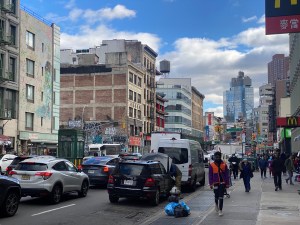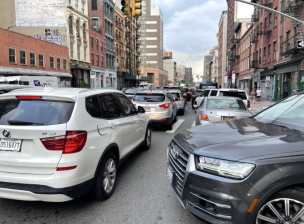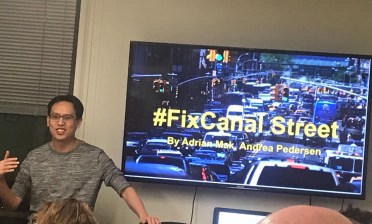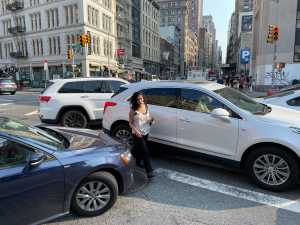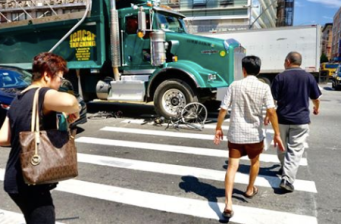Op-Ed: It’s Time for Immediate Action on Canal Street
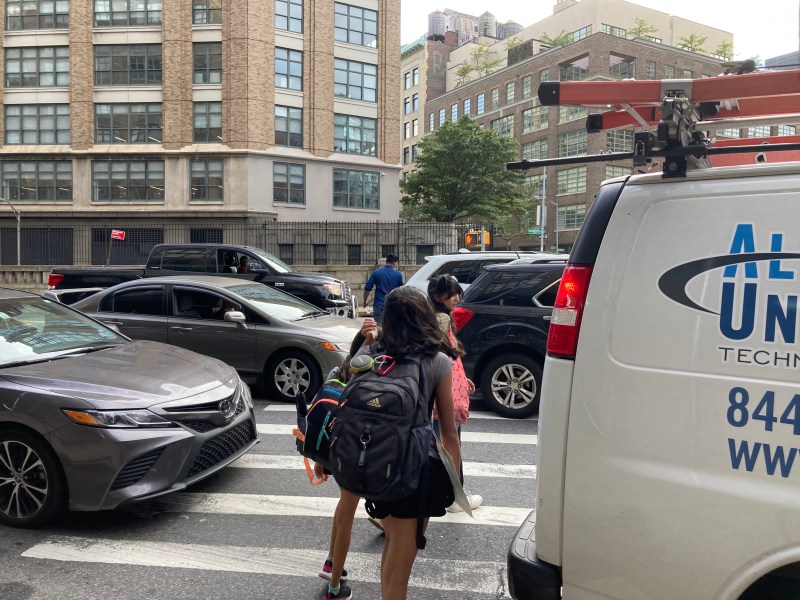

On Monday, I and many fellow concerned citizens, attended the Department of Transportation design workshop, “Canal Street Safety Improvements.” I was glad for the opportunity to listen to what DOT our Council Member Chris Marte had to say, but pressing questions remain:
What is to be done about traffic and safety on Canal Street? Why has only there been such negligible action taken in response to health and safety issues that have been studied and re-studied, quite literally, for decades?
Decades of inaction
The DOT has operated in fits and starts … and stalls.
- “The long drive to a safer and saner Canal Street may get a little momentum on June 7 and 8 when residents, businesses and community groups will be able to give transportation officials their ideas for long-term improvements for the congested and dangerous corridor.” (The Villager, June 2005)
- “Widened sidewalks, fewer left turns and new stop light patterns are among the changes that could relieve the chronic traffic mess that is Canal Street, according to a recently released long-term study. Left unchanged, Canal and its neighboring side streets will only grow worse.” (Tribeca Trib, January, 2011)
- CB1 voted unanimously that DOT should begin improvements to safety and congestion on Canal Street. (Streetsblog, March, 2020)
And yet, nothing seems to be done. Canal Street continues to represent the ne plus ultra of problems as to street design and the use and allocation of social space. Canal Street is the upside-down world of urban space.
Consider only what the DOT itself acknowledged at this week’s workshop:
- Pedestrians account for 65 percent of users of Canal Street yet 60-70 percent of street space is allocated to cars and trucks. (A Transportation Alternatives study of Canal Street presented to CB1 claimed motor vehicles claim up to 90 percent of the street space.)
- Canal Street is, objectively, dangerous, as the DOT slide (right) reveals. And, as tragic as these figures are, they again belie the lived experience of pedestrians, cyclists and sidewalk workers who are in constant need of tight rope walking through dangerous traffic all along the Canal Street corridor.
- Not to belabor the obvious, but, Canal Street is gridlocked. The DOT pointed out that there are no less than 13 lanes of traffic – as in 13 lanes of traffic — that feed the Holland Tunnel entrance every day.
- There is no biking or micro-mobility infrastructure on Canal Street. Yet cyclists are frequently injured there.
These opening acknowledgements by DOT could also have included the negative effects of environmental and noise pollution, the lack of sidewalk equity for the street vendor community, the lack of enforcement against cars and trucks blocking the box and disregarding pedestrian crosswalks, the particular dangers to senior members of the community from undertaking the simple act of crossing the street.
Moreoever, all of these conditions exist despite the posting of traffic cops to every intersection along Canal and enormous cost and no benefit.
A time for action
Following the initial presentation by DOT representatives, call participants were invited into break-out sessions” to discuss particular problems with Canal Street and to make suggested improvements.
My session began with the moderator asking those on the call to discuss what we love about Canal and what we think needed to be fixed. Perhaps needless to say, the “love” portion of the discussion was dispensed with quickly.
Clearly, those of us on the call do love Canal street and the neighborhoods it serves. But our love we have for this street exists in spite of the conditions on the street itself, which are to be endured and not celebrated.
If one thing was true on the call, it is that we are out of patience for discussion of large, multi-year infrastructure projects. We may dream of a tree-lined median running the middle of Canal Street; sidewalks doubled in size; generously sized bike lanes. But enough of dreams. It’s time to take immediate action to alleviate the intolerable conditions on Canal Street.
Easy answers
There were many fine suggestions presented on the call — virtually none of which require capital expense or massive restructuring. Here are but a few that drew overwhelming consensus:
- First and foremost is the need to improve pedestrian safety:
- newly painted and even elevated crosswalks;
- enforcement against cars and trucks that block or invade crosswalk space
- speed cameras at all intersections, plus additional traffic calming measures
- better and more generous signal timing for pedestrians
- There is an urgent need to improve overall conditions of “social” and “sidewalk space”
- Widen sidewalks
- Enforce against double-parking and placard abuse
- Installation of noise-monitoring devices
- The mode-share of the street needs to be re-aligned
- Time for the addition of bike lanes and micro-mobility space
- Removal of any parking along the street

Whose burden?
In law, there is a concept known as “shifting the burden of proof,” meaning, a change in responsibility of proving one’s case. It’s all too clear that for decades the “burden of proof” for fixing Canal Street has rested on the shoulders of transportation advocates, those concerned about use of urban space, and local residents. It’s time now to make immediate changes to Canal Street and thereby to shift that burden to the drivers and operators of motor vehicles. Let them justify taking up 90 percent of the precious urban space that is Canal Street, let them argue to remove bike lanes and micro-mobility infrastructure, let them argue for the removal of speed cameras and noise-detection devices, let them justify the placard abuse and the need for car storage.
Council Member Marte spoke at the end. He acknowledged the time is “long overdue” to take action in response to the dire conditions of Canal Street. He pledged his support to take action. I, for one, hope Marte will live up to these words. The problems and the immediate solutions to fix Canal Street are all too well known. So, the question is: will he have the political will to end decades of inaction and take definitive steps to improve fix Canal Street?
The DOT has set up a landing page to solicit public comment. Click here.
Originally from Brooklyn, lawyer Joseph Tedeschi lives in Manhattan with his wife Yin Yue and their adopted puppy M&M. Tedeschi is a member of the Board of Directors of Volunteer Lawyers for the Arts, NY and is a passionate advocate for safer streets and social space in New York.

